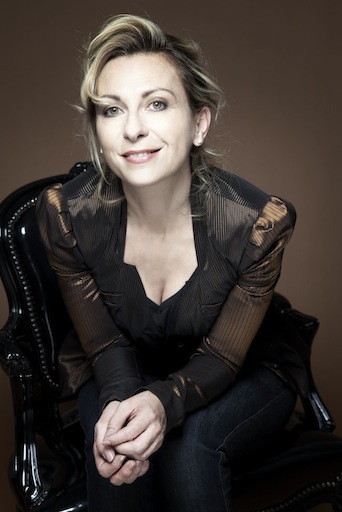Dessay and Dumaux light up Handel’s “Cesare”

Natalie Dessay performed in Handel’s Giulio Cesare in Egitto” Sunday night at Lincoln Center. Photo: Simon Fowler
A serendipitously fine Handel season that started with a great concert performance of Alcina at Carnegie Hall continued Sunday afternoon with a visit from Le Concert d’Astrée and artistic director Emmanuelle Haïm. In Alice Tully Hall, as part of Lincoln Center’s Great Performers series, the group played selections from one of the composer’s masterpieces, Giulio Cesare in Egitto, fronted by soprano Natalie Dessay as Cleopatra and countertenor Christophe Dumaux in the title role. More modest in scope and ambition than the Alcina performance, the concert still had moments that were surpassingly powerful.
The same musicians, with the exception of Dumaux, produced a recording of this material on the Erato label in 2011. There is a lot of stylish playing and singing on that disc, and also a lot of mannered playing and singing—a frequent problem with Haïm’s leadership on recordings. In contrast, the live performance was excellent throughout, musical without being didactic, centered on focused playing and style, and some stunning singing from Dessay.
Le Concert d’Astrée is a period instrument chamber orchestra, and their sound is on the reedy end of the spectrum, with especially colorful timbres from the cellos, bass and bassoon. Too small to be called big, they instead produce a quality that is wide. They also spend appreciably more time getting into tune even many other period ensembles.
Haïm’s direction immediately surprised with its natural ease, precise but relaxed rhythms, and a sense of long, colorful phrasing. Where on recordings there can be a showy emphasis on downward pointing articulations at the start of phrases, in the overture and throughout the concert the music maintained a steady, horizontal flow, the counterpoint of the continuo and melody meshing easily.
Dumaux made the first entrance, with “Taci! … Cieli, e qual delle sfere,” the first of nine vocal excerpts that managed to convey the emotional drama between the two characters, and some of the humor, while leaving out much of the plot. But plot is the least of it in Handel.
Even for a countertenor, Dumaux has an unusually high, ripe sound. He has the agility and charisma the music demands, though it seemed to take him most of the first half to warm up—his voice sounded firm but he did not project fully over the orchestra until after intermission.
Dessay sounded fantastic from the first note of “V’adoro, pupille,” then got even better. Her approach to the music was radically simpler than on the recording, and different from the norm for singing Handel. Her phrasing was stripped down to the essentials, and she eschewed a great deal of ornamentation, saving her trills for key moments.
Everything came out with a graceful, at times almost languid, ease. She sang with an unusually fluid legato, seeming to wait too long behind the tempo, before uncannily appearing, as if transported, on the next note.
This gave startling weight and transparency to her expression, with nothing between her and what the music had to say. Her “Che sento? Oh Dio!” was enthralling, her sustained pianissimo at the end was aching. And she was dazzlingly athletic in “Forzai l’ingresso.”
Cleopatra, of course, has wonderful material in the opera, while Cesare, in these selections, has plenty of fun. Dumaux strutted and swaggered, physically confident and commanding. His duet with first violinist David Plantier in “Se in fiorito ameno prato” was terrific, Dumaux arrogant and teasing, Plantier raising the stakes with witty, spidery playing of his obligato and solo parts.
Dumaux was at his best after intermission, with real vocal presence and expressive flexibility in “Dall’ondoso periglio” and in the concluding duet, “Bellissima Cleopatra … Caro! Bella!” Despite the abridgments and lack of staging, the emotional tensions and transformations of the characters were clear and deep.
There was a curious instrumental interlude in the concert: Haïm interpolated the Suite in G Major from the Water Music in between arias in the first half. There was no apparent logic to this, although the series of dance forms, with excellent solo playing from flutist Sébastien Marq, came off as a ballet section of the opera.
The suite was as stylish and enjoyable as everything else on the program, which included, after two long ovations, a gorgeous and earthy encore, “Kind Health Descends on Downy Wings,” from the Ode for the Birthday of Queen Anne.
The Orchestra of the Age of Enlightenment appears in Lincoln Center Great Performers, playing Smetana, Brahms and Dvorak on February 28. LCGreatPerformers.org



Posted Dec 01, 2014 at 8:23 pm by Maureen Marr
It is “A serendipitously fine Handel season.” Alcina was brilliant; Cesare even more so.
An explanation from the program about the inclusion of the Suite in G Major:
“Caesar’s dizzying vocal engagement with the bird’s song depicts his sexual arousal, and in this evening’s performance, the Suite in G major (Water Music) offers an instrumental interlude to draw a veil of modesty over the likely subsequent events.”
A charming addition to a memorable concert. Dessay and Dumaux were perfection, as was violinist David Plantier.
Posted Dec 29, 2014 at 3:12 pm by George Grella
Of course, I had a fine a time as you did, Maureen! The program note explanation for the Water Music bit didn’t convince me, but maybe I’m too literal minded.